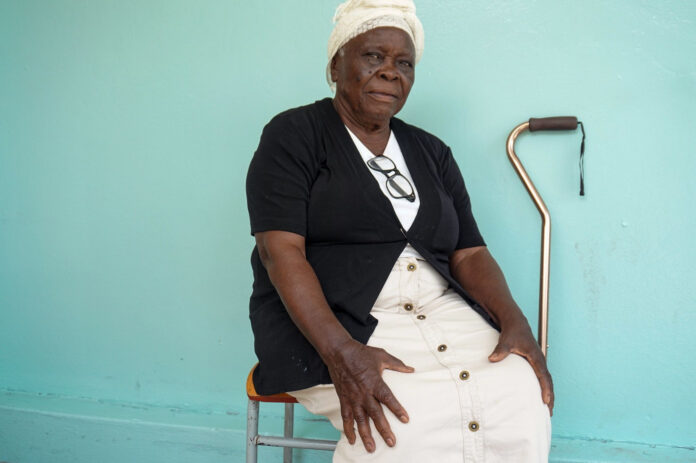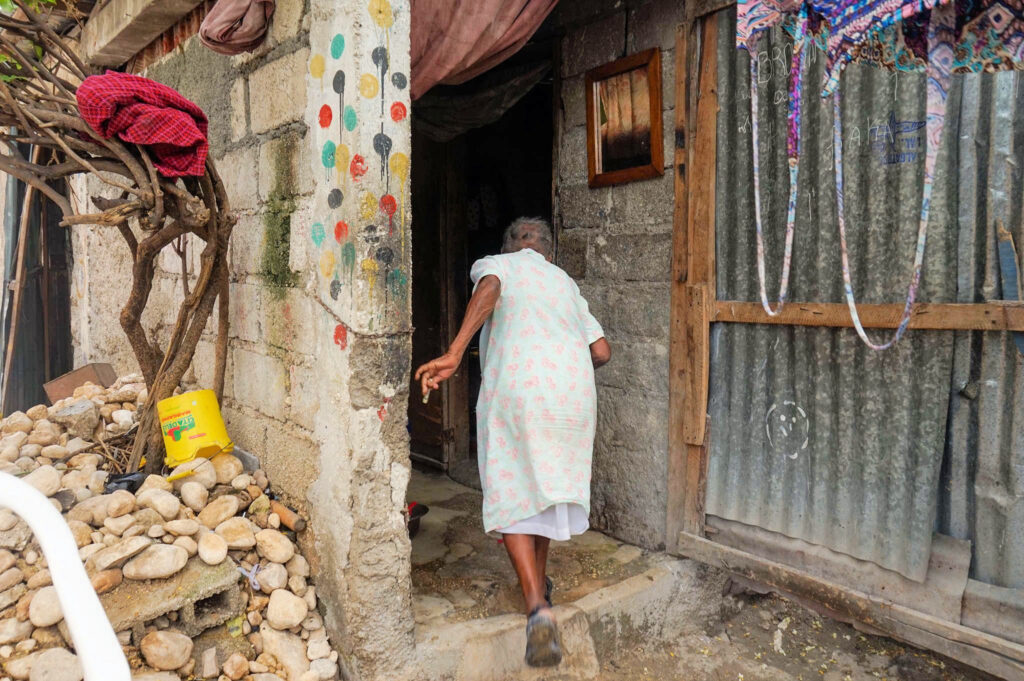
PORT-AU-PRINCE, HAITI — Tianne Joseph hunches over on a chair in her small house with a bucket of cigarettes for sale, waiting for clients from her neighborhood to pass by.
At 93 years old, the mother of four and grandmother of several has no option but to keep working.
“I need to run my business, because I need money to take care of myself,” says Joseph, who was widowed 35 years ago.
It has been a heavy responsibility for Joseph since her husband’s death, trying out various small businesses and having to rebuild the house she inherited from him after an earthquake destroyed it in 2010. She is tired and wishes she could rest, but with no social aid, she has to keep toiling.
“I cannot afford to go to the hospital. What I sell is not even enough to feed myself,” she says.

Joseph is unable to depend solely on her children as they have obligations toward their own families. She lives with one of her daughters who doesn’t have a job. Times are difficult for Joseph, despite friends who sometimes help her out. One friend often visits and sometimes gives her money to go to the hospital. Joseph considers herself somewhat fortunate, though, as she does not suffer from severe health problems. At her last hospital visit, she was advised only to eat well.
She is one of thousands of older adults in Haiti who find themselves with no option but to work to the very end given the lack of social safety nets such as pensions, worsened by the economic crisis and lack of homes for older people.
Despite the great burden this demographic faces, there is only one public retirement home in Port-au-Prince, and the country’s economic challenges have left it struggling to stay afloat. The retirement home, Asile Communale, is over a century old and is the responsibility of the municipality. It hosts older and disabled people who have no other recourse, providing them with shelter, health services and food.
Gaspard Maccéllus, who has been head of department at the home for two years, says the home is operating below capacity.
“We currently have 51 people. We could house up to 120, but we don’t have the means to,” Maccéllus says.
In Haiti, persons over the age of 65, who make up 4.9% of the country’s population, are among the most vulnerable groups in society, facing various challenges such as poverty and lack of access to health care. The retirement age for civil servants is 58, but those under the age of 25 represent less than 1% of the government workforce, while those over 55 account for almost 20%. This suggests that a considerable proportion of civil servants work beyond the legal retirement age. In 2017, more than half of all civil servants were over the age of 45, and 1% were 75 or older.
In Haiti, retirement brings ‘a sense of sorrow’
According to a 2018 government report, “civil servants who have already reached the required age don’t want to leave, because retirement is perceived as the end of life rather than the beginning of a new life with less pressure. It doesn’t bring a sense of accomplishment, but rather a sense of sorrow.” The report also states that low pensions leave retirees unable to sustain themselves in the lifestyles they had when they were working.
Marlene Evelyne Norbert, 76, has been a private-school teacher in Port-au-Prince for more than 56 years and continues to work. “We don’t get a pension,” she says. “It’s up to you if you want to leave or stay and continue working.”
More than 80% of the jobs in Haiti are in the informal economy, meaning the vast majority of Haitians have no pension to fall back on, according to a March report from the International Organisation of Employers.
All of this has been worsened by social, political and economic crises, which have exacerbated poverty. According to the National Coordination for Food Security, rising food costs pose a considerable problem for Haitian families. High unemployment rates, corruption and persistent political instability put older people at a disadvantage, making their lives even more difficult. According to the Haitian Institute of Statistics and Informatics, the country has minimal production and relies heavily on imports, with a peak inflation rate of 46.4%.
Paulena Pierre, 86, lives with relatives in Port-au-Prince. She has no children and feels her hosts are losing patience with her.
“Community homes are in poor condition and are very badly structured because the state has forgotten its people”
“I understand they are not my children. Taking care of an elderly person who isn’t your mom is not easy,” she says.
Pierre runs a small business, selling ripe bananas and eggs. It isn’t working well, but with it she is able to earn a daily meal.
“I depend on the kindness of good Samaritans. It would be better if I could find somewhere to live without worry, without thinking about what I can sell to cover my everyday needs,” she says.
Struggles at Asile Communale
As the only public retirement home in the capital city, Asile Communale struggles to support those in the home, even at an occupancy rate that is around 40% of its capacity.
“We work every day. We have the support of Food for the Poor, who supplies us with food every three months, as well as private individuals,” Maccéllus says, referring to the international Christian nonprofit that has operated in Haiti since 1986. “We sometimes lack stock to properly feed all our residents, but not one day goes by where we don’t feed them.”
Deluis Louissaint, 73, has lived in the retirement home for over 18 years and says the missionaries who used to help them can no longer do so, in spite of their best efforts.
For Louissaint, the change at the home caused by the worsening of Haiti’s already fragile economic and political situation is painfully obvious. He remembers with fondness a time when conditions at the home were better. Missionaries and other individuals would visit them and bring provisions, but with the current insecurity, no one is taking the risk of coming to the home. Despite the challenges, Louissaint is still among the lucky few who get this type of support.
Maccéllus cites the country’s economic state as a hindrance to their ability to help more people. “Given the situation of the country today, we buy 7,500 [Haitian] gourdes’ [about 55 United States dollars’] worth of water every week. To cook food, we use propane gas sold around 450 gourdes [3 dollars] per gallon. We have three stoves that rely on gas — 5,000 gourdes [37 dollars] lasts us barely four days, depending on the amount of food to cook per day,” he says.
Their struggle to support this area, which is hard to access due to insecurity, puts them in a difficult situation. Since the assassination of President Jovenel Moïse in 2021, violence has intensified. Gangs now control more than 60% of the country’s territory.
“We do not operate at full capacity due to lack of funds. We give food twice a day, so we can finish early, given that the home is in a zone that is prone to insecurity,” Maccéllus says.
The shortened hours are to protect the safety of employees who commute.
Working as a choice?
Michel Acacia, sociologist and professor at the State University of Haiti, says the country has a situation where the informal sector is more important than the formal sector, leaving most workers with no fixed income. Most Haitians have to keep working, sometimes into old age, to sustain themselves, as they have few other options.
He says the problem must be addressed through macroeconomic structures.
“For those aged 60-65 that have worked for the government, working until this age is often a choice. For those that have worked in the informal sector, it’s a necessity because there is no pension,” he says.
Pension data, however, contradicts this claim.
Haiti lags behind in providing social safety nets for its population, with only 5.8% benefiting from any form of social protection. Shockingly, a mere 0.4% of persons above retirement age received pensions in 2020, based on the latest data from the International Labour Organization. In stark contrast, in neighboring Dominican Republic, 53.6% of the population benefits from social protection and 11.3% of people over the retirement age received pensions in 2020.
Elionor Devallon, deputy director of the social assistance fund under the Ministry of Social Affairs and Labor, says more than 9,000 vulnerable people over the age of 65 receive a subsidy of 2,000 gourdes (15 dollars) per month from the fund. This, however, still leaves thousands more with nowhere to turn.
Lazare Jean François has been the coordinator at the Foundation Rose Ferrier, an organization that has helped older people in Gressier, a part of Port-au-Prince, for seven years.
He explains that most older adults are economically defenseless and exposed to disease, and with the worsening socioeconomic situation, they do not even have the means to eat a meal a day.
“We do our best with what we have. We give them a food bundle once a month, and if possible, we take them to a doctor. We help those who are sick as much as we can, and when they die, we pay for part of their funeral. For their birthdays or other festive occasions, we organize outings with them,” Jean François says. “Our mission is to be with them so that they can live out the last part of their lives in a dignified way.”
Low pensions and a high proportion of informal workers
Economist Enomy Germain says there is no data on the number of older people who continue to work to support themselves (as those who have formal employment and a pension are few), but in the public sector, for example, some employees work past retirement age.
He explains that the reason “is that the state pension is too low,” despite the fact that there is a legal provision for pensions in Haiti.
“Any public employee or civil servant in active service, having provided at least 10 years of service and suffering from an absolute incapacity to work, is entitled, regardless of age, to a pension equal to half of his or her salary without exceeding 12,500 gourdes [91 dollars],” the law states.
“I depend on the kindness of good Samaritans. It would be better if I could find somewhere to live without thinking about what I can sell to cover my everyday needs”
In 2017, the number of permanent civil servants was 81,948, of which 23,429 were women (28.6%) and 58,519 were men (71.4%).
Raphael Théoma Daniel is the director and head of public relations for the Haitian Office for Citizen Protection (OPC), a state agency for human rights.
He explains how, in other countries, the state has distinct plans for each age group: from birth to 18, when citizens enter the labor market, then from 18 to 65, when they have to prepare for retirement.
But there is no such system in Haiti, making it harder for people as they age.
“The OPC is fighting for good governance and against corruption,” Daniel says, “and if we are successful, we’re sure that the state will be able to implement this system.”
Daniel says there aren’t enough retirement homes, and most older people rely on their families. “Community homes are in poor condition and are very badly structured because the state has forgotten its people,” he says.
Daniel says his organization has made proposals to the government, asking them to provide social protection for vulnerable people, as it’s a human rights issue.
Despite the challenges she faces, Joseph hopes to celebrate her 100th birthday in seven years. “It’s in a long time,” she says, “but I hope God preserves my life.”
Anne Myriam Bolivar is a Global Press Journal reporter based in Port-au-Prince, Haiti. Megan Spada, GPJ, translated this article from French. This story was originally published by Global Press Journal.











[…] 93 and Still Working: Retirement Is a Luxury Few Haitians Can Afford Haiti Liberte […]